- Home
- Seanan McGuire
Snakes and Ladders Page 2
Snakes and Ladders Read online
Page 2
“I was,” Mary admitted. “That’s something they don’t really tell you about the afterlife. That it’s cold.”
“Well, you go ahead and warm up, then, and you can come trick-or-treating with us, if you’d like. I’m sure Alice won’t mind.” As Fran spoke, Alice turned to wave from the porch, and then to scamper down the driveway toward them. “She’s missed you.”
Mary smiled. “I’ve missed her, too.”
Alice came running up, red-cheeked with excitement. “Mama, Mama, they gave me a whole chocolate bar!”
“That is surely cause for a ticker-tape parade,” Fran said solemnly. “Look who’s here!”
“Mary!” said Alice, seeming to notice the other woman for the first time. Turning, she flung her arms around Mary’s legs. “I missed you!”
“Hi, sweet girl,” said Mary.
“Where’ve you been?” Alice pulled back, frowning at her former babysitter. “You left.”
“Honey, Mary’s dead, remember? She’s been off learning about how to be a better ghost.”
Alice’s frown deepened. “Then why’s she dressed like Little Red Riding Hood?”
“Because she wanted to walk with us,” Fran said. “There’s no trick-or-treat for dead people, so she has to watch you.”
“Oh.” Alice’s eyes went very wide, and she rummaged in her pillowcase, pulling out her much-lauded chocolate bar and holding it out to Mary. “You need this more than I do.”
Mary blinked, taking the chocolate bar. And then, helplessly, she began to laugh. “Well, yes,” she said. “I guess I do.”
*
Half an hour later, their impromptu trio—or troop, if they were counting Alice’s bagful of illicit cryptid mice—was making their way along Main, heading for the intersection with Sycamore. Alice had decanted her bag into Fran’s about half a block before, before sprinting off ahead to join a bevy of kids from her kindergarten as they descended on a house rumored to have particularly good candy. Fran munched on a caramel apple as they walked, while Mary had pilfered an assortment of small chocolates, and was unwrapping and eating them, one by one.
“I miss chocolate so much,” she said. “There is no chocolate in the lands of the dead. It’s awful.”
Fran shook her head. “If you ever wanted to convince me that you were in Hell, this’d do it. You free to babysit next week, or are you goin’ back to the afterlife to keep learning about ghostin’?”
“I think I have the basics down by this point,” said Mary. “I’d be happy to babysit. Friday night?”
“Thursday through Monday okay? We’re going to Chicago to see some family friends, and it’d be better if we could leave Alice with someone who’s actually allowed inside the house.”
“You should really find a babysitter you’re willing to let past the front door,” said Mary, half laughing.
Fran rolled her eyes. “Oh, yeah, that’s an easy task. ‘Hello, teenage girl who wants to make some pocket money, do you want to come over to our house full of guns, swords, knives, various other types of weaponry, and monster taxidermy? We’ll pay you two bucks an hour.’ I think we’d be brought up on charges of child abuse inside of the week.”
Mary laughed again. “Oh, come on. It’d be fun to watch, and most babysitters are more open minded than you’re giving them credit for being.”
“Says the ghost of a sixteen-year-old girl,” said Fran, continuing to munch on her caramel apple.
“Honestly, I just wonder how you keep Alice from hurting herself.”
“Oh, that’s easy enough; the talking mice that live in the attic and worship the Healy men as gods keep a pretty good eye on her. We’d let them babysit, ’cept they’re too small to work the stove and they couldn’t get her to the hospital if anything did manage to happen, God forbid.”
There was a moment of silence before Mary said slowly, “Every time I think I’ve reached the bottom of the well, you go and dig down further. I’m still not comfortable with the talking mice, you know.”
“Oh, I know. Alice has a bunch of ’em in her trick-or-treat bag. You should say hello when she comes back. They call you ‘the Phantom Priestess,’ an’ as far as they’re concerned, you’re part of the family.”
Mary sighed heavily. “All right. I’ll say hello to the talking mice.”
“Y’know, for a dead girl, you sure can be a stick in the mud.” Fran took another bite of her apple, turning to watch as the cluster of trick-or-treaters up ahead started to scatter. “I think maybe we should stop off at the diner and get ourselves some ice cream sodas, and then head on home. Johnny’ll be glad to see that you’re doing all right for yourself, what with the vanishing into the afterlife for more’n a year and all.”
“I didn’t mean to worry you,” said Mary, cheeks reddening.
“You know, I never get tired of watchin’ a ghost blush. It’s just so bizarre,” Fran said. Then she paused, expression going slowly blank. The trick-or-treaters from Alice’s Kindergarten had scattered, returning to their respective parents and sitters in ones and in twos. Most were still visible, making their ways to the next houses along their individual routes. She could see ghosts and goblins, princesses and policemen, werewolves and witches, vampires and Frankenstein monsters…but no cowgirls. Not a single one.
Catching her expression, Mary turned to scan the sidewalks, before asking the one question—the one brutal, unaskable question—that Fran couldn’t bring herself to ask out loud.
“Fran?” she asked. “Where’s Alice?”
*
Halloween was officially and forever the best holiday ever in the whole wide world, period, as far as Alice was concerned. You got more presents for Christmas, and there were colored eggs to find on Easter, but her parents didn’t like Santa Claus or the Easter Bunny, or really any of the holiday folks that seemed to visit everybody else she knew. Halloween didn’t have any weird cryptids trying to break into the house and making Daddy line the fireplace flue with spikes or paint lamb’s blood above all the doors. Halloween just meant costumes and candy and surprises, like Mary showing up, even after stupid Mikey Caldwell said dead meant you didn’t get to visit anymore. Showed what he knew. Dead just meant you couldn’t go trick-or-treating, and while that was sad, it was different from no more visiting ever.
Most of the houses were giving out little candy bars, fistfuls of taffy, rock candy, chewing gum, and candy corn, although she’d also acquired six popcorn balls, three caramel apples, a dozen full-sized chocolate bars, and eight whole pennies of her very own. And her costume was definitely the best. The others were all monsters, and she had the guns. Monsters couldn’t do anything against guns.
One of the kids at the front of the pack rang the doorbell, and the entire mob shouted “TRICK-OR-TREAT!” as the door swung open. As they started to move forward to get the candy, a hand clamped itself over her mouth, and another over her eyes, and she felt herself yanked backward, away from the other trick-or-treaters. She could hear them laughing as she was hauled back into the bushes beside the house, out of view; none of them had noticed her abduction.
Kicking, Alice tried to scream, but the sound was muffled by the hand clamped over her mouth. A third arm grabbed her feet, yanking them down, and she felt rope being wrapped tight around her ankles, tying them together. She kicked again, trying to throw off the ropes, and something hard slammed into the side of her head, hitting hard enough to bring tears to her eyes. Alice moaned, suddenly afraid.
Unlike most children, who learned early to be afraid of monsters and scary stories and shadows in the dark, Alice had learned that sensible monsters and clever shadows were far more interested in being afraid of her, or at least in being afraid of the rest of her family. She’d never been worried about getting hurt or being careful, not when she knew her mother or father, or best of all, her grandparents would be right behind her. But this was something new. Her mother was right there, and yet somehow, they’d taken her, and they were tying her hands together, and her he
ad was throbbing where they’d hit her. They’d hurt her. They actually hurt her.
If they could hurt her, what else could they do?
“If you scream, I’ll cut off your left hand,” said a voice next to her ear. It was a calm voice, filled with a no-nonsense seriousness that made Alice go cold. “Now, I’m sure you have people with you who’d follow the sound of you screaming, and might even find you before we could get away from here. But I’ll cut off that hand before they can reach us, and nothing they can do will ever put it back again. Do I make myself clear?”
Mutely, Alice nodded. She was still clutching her trick-or-treat bag, and the weight of it was the only reassuring thing left in the world. As long as she had the bag, she wasn’t alone with strange people who wanted to hurt her, because as long as she had the bag, she had the mice.
“All right,” said the voice, and the hand across her mouth was withdrawn. Alice took a deep, unsteady breath, grateful for air that didn’t taste like sweat and someone else’s skin. She didn’t scream. She had the mice. Her mother would find her. And she liked having both her hands.
“Good girl,” said the voice. “Oscar, get the blindfold on her.” The hand across her eyes withdrew, and she caught a quick, blurry glimpse of the back of the house, and several people standing in a rough circle around an empty hayrick. Then a band of cloth was being tied around her eyes, and she was being thrown—literally thrown, like she was nothing more important than a sack of potatoes—into the back of the cart. It knocked the wind out of her, and she huddled there, blindfolded and bound, clutching her trick-or-treat bag, as they heaped foul-smelling straw all over her in great, uneven handfuls.
It felt like forever before she heard the voice say, “That’s enough. She’s hidden. Come on, now; we only have four hours to prepare everything before midnight comes and this night of grace is ended.” There was a general murmur of assent, and the cart under Alice began to roll.
She squirmed. The ropes binding her ankles and wrists were too tight; even if she could somehow manage to roll out of the car, she wouldn’t be able to do anything other than lie on the ground and wait for something even worse to come along and gobble her up. Worse yet, the men might catch her again, and decide they needed to start cutting things off. “Never assume people are bluffing, Ally,” her mother always said. “People only bluff when they’re out of ammo, and unless you’ve been counting shots, you can’t be sure of that.”
She wasn’t entirely clear on what that meant, but she was pretty sure it meant, at least partially, “Don’t be dumb when men who want to cut your hands off already have you tied up, because that’s the worst time to be dumb in the whole world, even worse than when the teacher calls on you.”
The wagon made a lot of noise as it rattled across the ground. Alice licked her lips, grimacing at the taste of moldy straw, and whispered experimentally, “Hello?”
There was no response from the men pulling the cart.
Alice waited as long as she dared—longer might have been better, but if she waited too long, she’d never be able to get the warning out in time for Mama and Mary to find her—before bowing her head toward her trick-or-treat bag, and whispering, “I think I’m in trouble. Speak really really soft, or you’ll be in trouble, too.”
There was a rustling noise, and then one of the mice was squeaking near her ear in a parody of a whisper, saying, “We are no longer with the Violent Priestess, O Younger Priestess.”
Unable to stop herself, Alice started to cry behind her blindfold, whispering fiercely, “It’s bad men, mouse, bad men took us. You have to tell Mama.”
“I am sorry, Priestess,” replied the mouse, “sorry and shamed, but we cannot.”
“What?” Alice asked, stunned. The mice were supposed to help her. That was how it worked. “Why not?”
“Because you are the Younger Priestess, Priestess, and the words of the Violent Priestess must come first, and she has Forbidden Us to Leave the Bag,” said the mouse, with true regret in its squeaky tone. “We are sorry.”
Alice frowned, trying frantically to come up with a way for the mice to tell her mother what was going on without leaving the bag. This sort of thing never happened to Cinderella. Sure, all her mice got turned into horses, but they didn’t say they wouldn’t help her get the lintels out of the fire just because her mother said she wasn’t supposed to play in the ashes. Really, this sort of thing never happened to anyone in fairy tales. Maybe they got eaten by trolls or kidnapped by witches, but…
Kidnapped by witches! Alice gasped, and then froze, waiting for a sign that she’d been heard. The wagon continued to creak noisily on, and no hands came plunging down through the straw to strike at her or cut anything off. “I know what you can do, and it doesn’t mean leaving the bag,” she whispered.
“Tell us what to do, Priestess,” replied the mouse, “and we will try.”
“First, you gotta chew a hole in the bottom of the bag. And then…”
*
“Ally!” Fran cupped her hands around her mouth, fighting to force down the panic that was rising in her chest like a living thing. “Alice Enid Healy, you come out of wherever it is you’re hiding right now, do you hear me? This isn’t funny! Alice!” Mary was halfway down the block, going through her own variation on the same mantra.
The other parents on the street shot sympathetic looks toward Frances and Mary as they hurried on, clutching their own charges a little closer and steadfastly not stopping to offer assistance. This was Buckley, after all. Start worrying about what might happen to other people’s children, and the odds were too good that you’d lose track of your own.
“Alice!”
The people at that last house didn’t even remember seeing her. The one cowgirl in a town full of monsters, and they hadn’t seen her. Somewhere between heading up the driveway to their door and the door opening, she’d simply disappeared. And Fran hadn’t seen it happen.
The panic was getting worse, and that thought didn’t do a thing to discourage it. She, Fran, had taken her little girl out trick-or-treating, had carried all the precautions she could think of, and she had lost her. Alice was gone.
“Mary, come back over here and follow me,” she called, turning to stalk grimly back to the house where Alice had disappeared. The owners had drawn their shades and taken in their pumpkins; they hadn’t offered to call the police, oh, no, not over a missing little girl, not when they could tell themselves she’d just wandered away into the night, but at least they’d stopped passing out candy. They’d make that small sacrifice to doing the right thing.
The ghost-girl dropped her hands and ran to catch up with Frances, holding up her skirt around her knees to keep it out of the mud. The habits and patterns of being alive died harder than the living themselves did. “Did you find something?” she panted.
“Mary, there’s no point in sounding out of breath when you haven’t got any,” said Fran, stopping at the top of the path and looking coldly at the surrounding area, looking for something out of place. Anything. Nothing was fast enough and untraceable enough to have snatched a little girl from plain view without leaving some marks behind.
“I have so got breath,” Mary said, sounding hurt. “As long as I’m physical like this, I’ve got as much breath as you do. I know you’re worried, but that’s no reason to start getting mean.”
Fran paused, glancing toward her, and sighed. “You’re right. Just…be quiet a moment. Let me think.” Mary nodded, quieting, and Fran resumed scanning the area.
There were a lot of muddy footprints on the path and porch, and a lot of muddy tracks on the lawn where it nudged up against the drive and walkway. The kids hadn’t always been careful about where they stepped. The house itself was fairly small, with leafless bushes flanking the porch to either side. Fran paused.
The bushes to the right of the porch were undisturbed, their branches too sharp to encourage trampling by random children. But the bushes on the left were bent slightly back, like somethi
ng had been dragged through them—something about the size and shape of a six year old girl. “This way,” she said, and plunged into the bushes, ignoring the way they snatched at her clothing and hair. She could hear Mary pushing through them behind her, moving much more reluctantly. For a dead girl, she was awfully reluctant to get herself scratched. “Put some life into it, Mary!” she snapped, and went crashing onward.
The bushes opened up into the backyard of the house. Fran could see shapes moving in the kitchen window, but she ignored them; if the owners wanted to call the police on her for trespassing, they were more than welcome to do so, and then she’d take a great deal of pleasure in explaining how they’d failed to call the police for the disappearance of her little girl.
As was frequently the case with houses on Sycamore, there was no back fence; the yard sloped down to the lake shore, grass gradually giving way to the rocky, hard-packed soil bordering the water. You could walk the length of Sycamore by way of that shore, never coming into view of the street above. Looking at that slope, Fran felt her heart sink. There wouldn’t be any tracks. There wouldn’t be anything to follow.
Mary squirmed out of the bushes behind her. “See anything?”
Fran shook her head. She was going to have to go home, get the others, and start a full-scale canvassing of the woods, and, God help them all, the swamp. If Alice had been taken into the swamp, they’d be lucky to find anything at all…but it was seeming more and more likely that they’d be forced to look for her there. She couldn’t have wandered away, and anything that hadn’t devoured her on the spot would be retreating to its lair before it ate.
“Fran?” Down by the water, Mary raised her arms and waved a mad semaphore, calling, “I think you should come and see this!”
Numbly, Fran walked down to join her, already rehearsing what she’d say to Jonathan and the others. We just went trick-or-treating, she’d say. I thought we’d be safe, she’d say. And then they’d beat the woods until morning, and if they were lucky, they might find something they could bury.

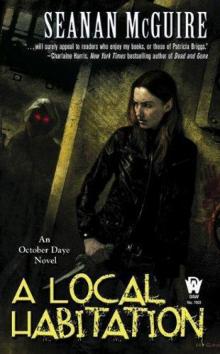 A Local Habitation
A Local Habitation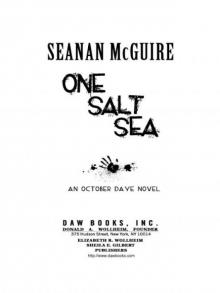 One Salt Sea
One Salt Sea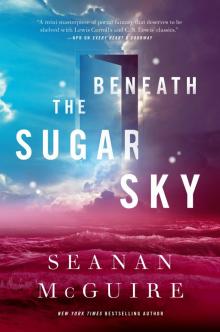 Beneath the Sugar Sky
Beneath the Sugar Sky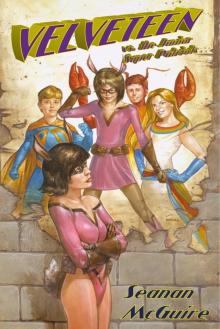 Velveteen vs. The Junior Super Patriots
Velveteen vs. The Junior Super Patriots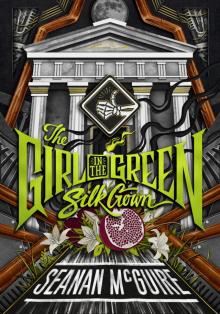 The Girl in the Green Silk Gown
The Girl in the Green Silk Gown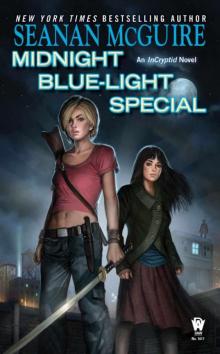 Midnight Blue-Light Special
Midnight Blue-Light Special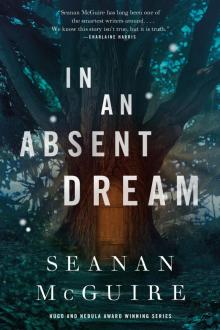 In an Absent Dream
In an Absent Dream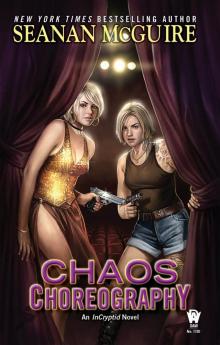 Chaos Choreography
Chaos Choreography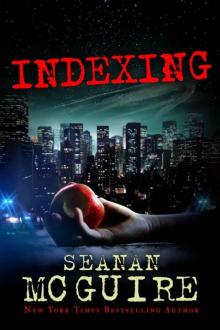 Indexing
Indexing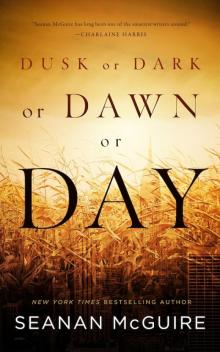 Dusk or Dark or Dawn or Day
Dusk or Dark or Dawn or Day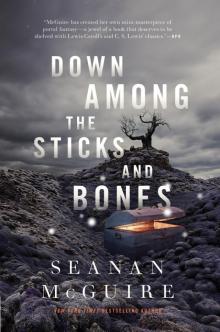 Down Among the Sticks and Bones
Down Among the Sticks and Bones The Razor's Edge
The Razor's Edge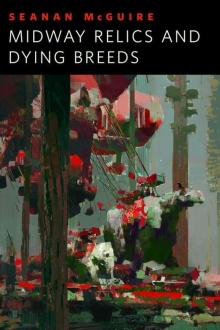 Midway Relics and Dying Breeds
Midway Relics and Dying Breeds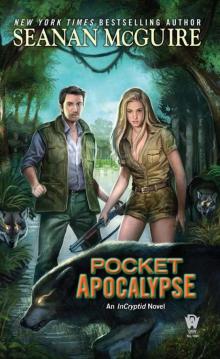 Pocket Apocalypse
Pocket Apocalypse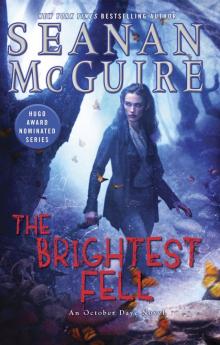 The Brightest Fell
The Brightest Fell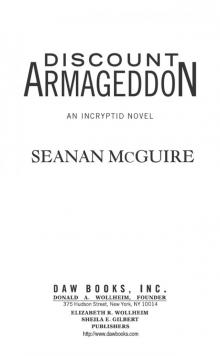 Discount Armageddon
Discount Armageddon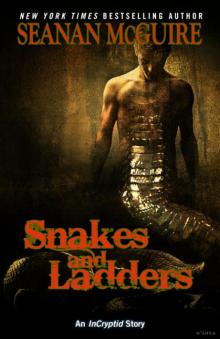 Snakes and Ladders
Snakes and Ladders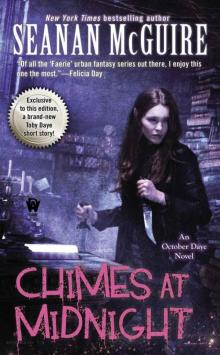 Chimes at Midnight
Chimes at Midnight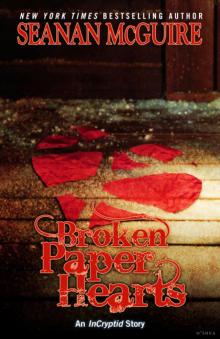 Broken Paper Hearts
Broken Paper Hearts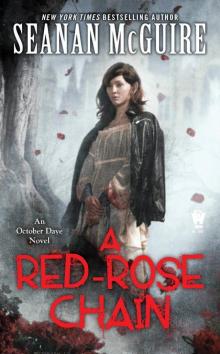 A Red-Rose Chain
A Red-Rose Chain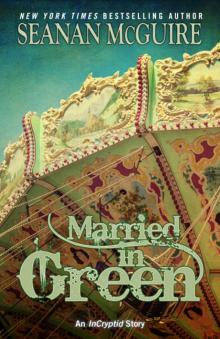 Married in Green
Married in Green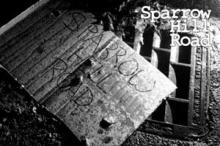 Sparrow Hill Road 2010 By Seanan
Sparrow Hill Road 2010 By Seanan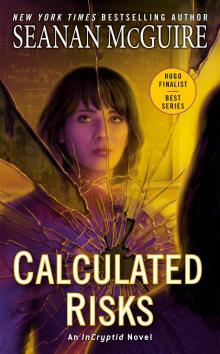 Calculated Risks
Calculated Risks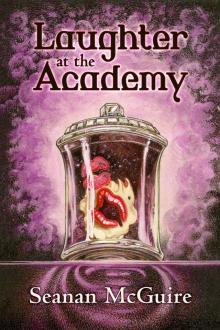 Laughter at the Academy
Laughter at the Academy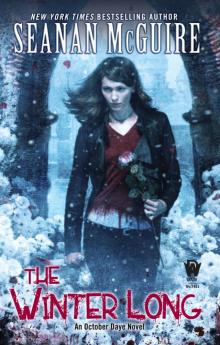 The Winter Long
The Winter Long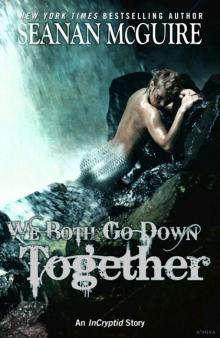 We Both Go Down Together
We Both Go Down Together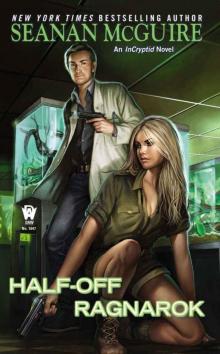 Half-Off Ragnarok
Half-Off Ragnarok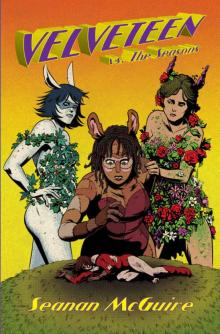 Velveteen vs. The Seasons
Velveteen vs. The Seasons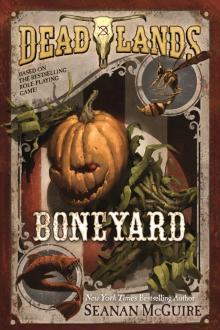 Boneyard
Boneyard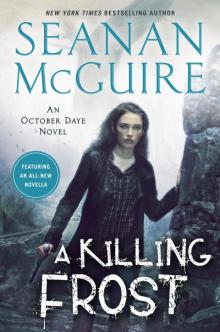 A Killing Frost
A Killing Frost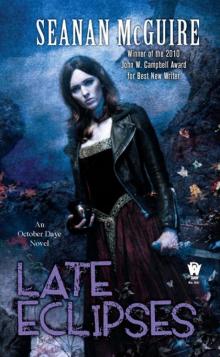 Late Eclipses
Late Eclipses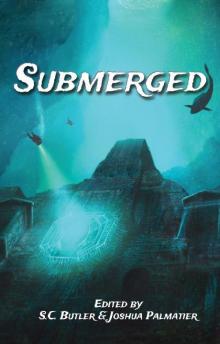 Submerged
Submerged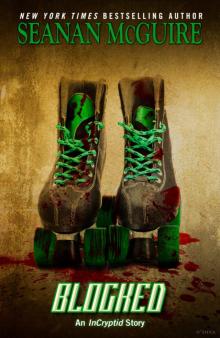 Blocked
Blocked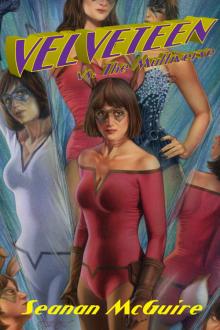 Velveteen vs. The Multiverse
Velveteen vs. The Multiverse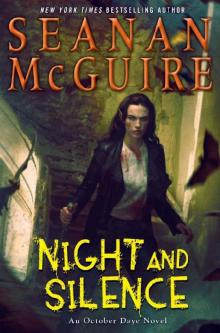 Night and Silence
Night and Silence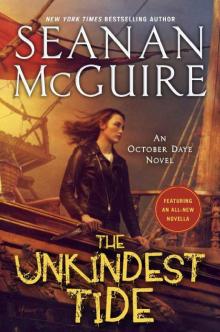 The Unkindest Tide (October Daye)
The Unkindest Tide (October Daye)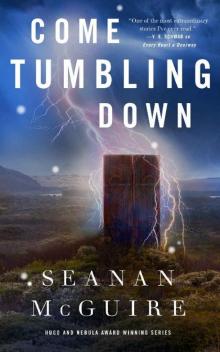 Come Tumbling Down (Wayward Children)
Come Tumbling Down (Wayward Children)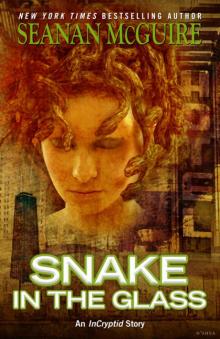 Snake in the Glass
Snake in the Glass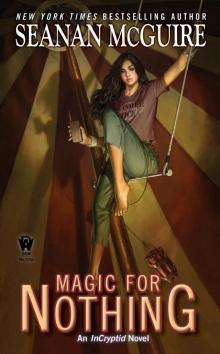 Magic for Nothing
Magic for Nothing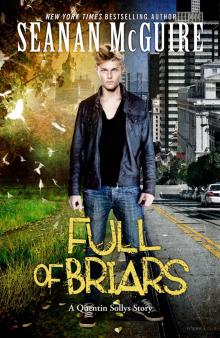 Full of Briars
Full of Briars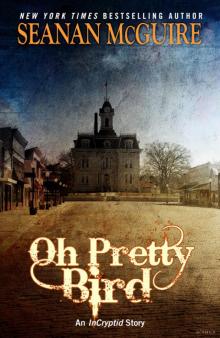 Oh Pretty Bird
Oh Pretty Bird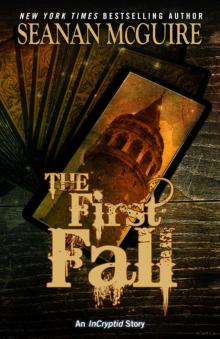 The First Fall
The First Fall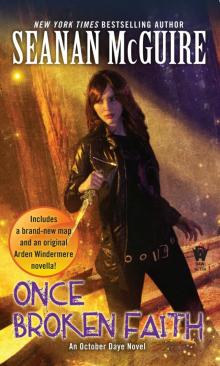 Once Broken Faith
Once Broken Faith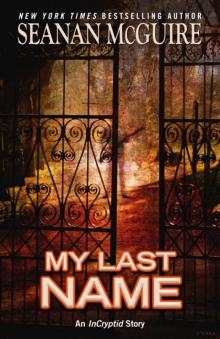 My Last Name
My Last Name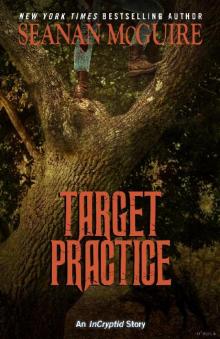 Target Practice
Target Practice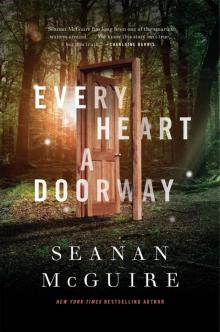 Wayward Children 01 - Every Heart a Doorway
Wayward Children 01 - Every Heart a Doorway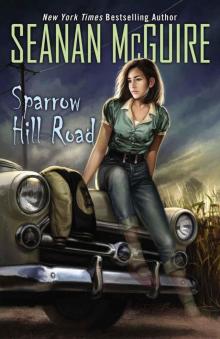 Sparrow Hill Road
Sparrow Hill Road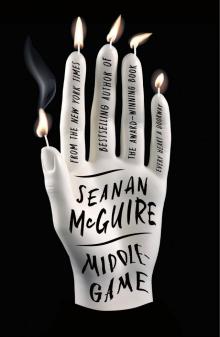 Middlegame
Middlegame Juice Like Wounds
Juice Like Wounds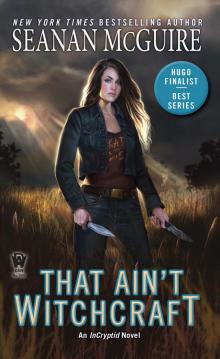 That Ain't Witchcraft
That Ain't Witchcraft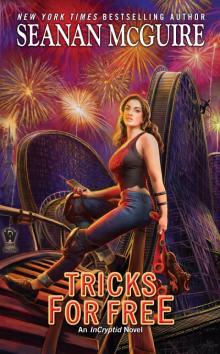 Tricks for Free
Tricks for Free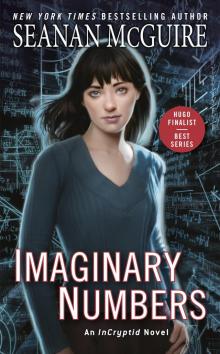 Imaginary Numbers
Imaginary Numbers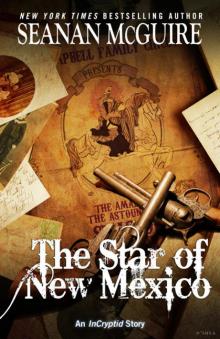 The Star of New Mexico
The Star of New Mexico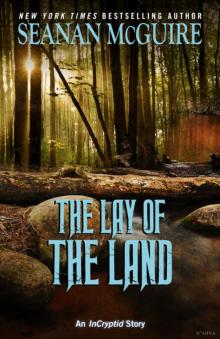 Lay of the Land
Lay of the Land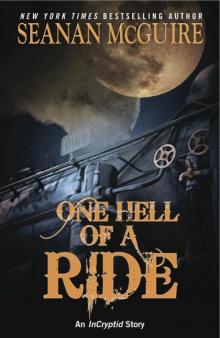 One Hell of a Ride
One Hell of a Ride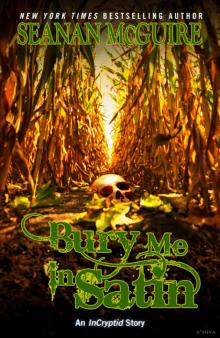 Bury Me in Satin
Bury Me in Satin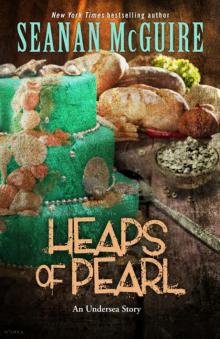 Heaps of Pearl
Heaps of Pearl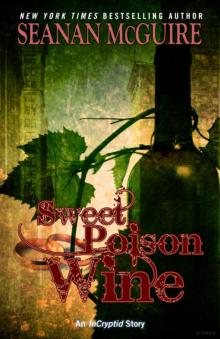 Sweet Poison Wine
Sweet Poison Wine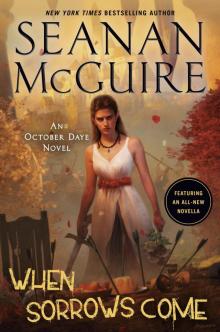 When Sorrows Come
When Sorrows Come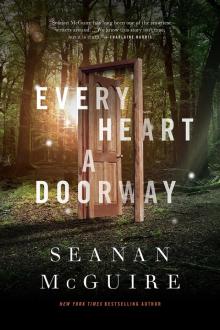 Every Heart a Doorway
Every Heart a Doorway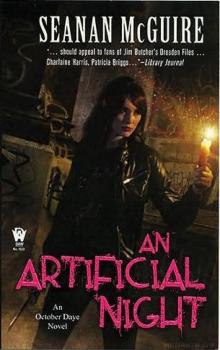 An Artificial Night - BK 3
An Artificial Night - BK 3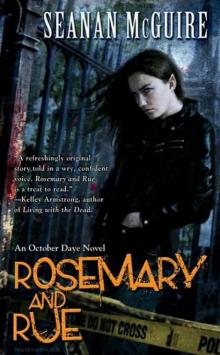 Rosemary and Rue
Rosemary and Rue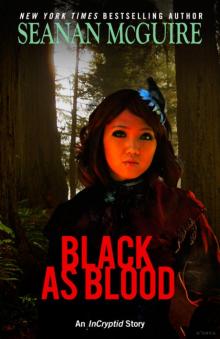 Black as Blood
Black as Blood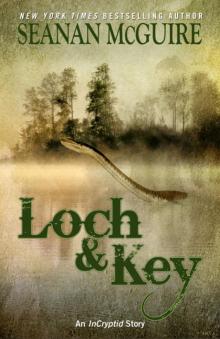 Loch and Key
Loch and Key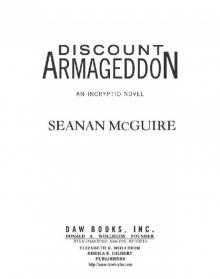 Discount Armageddon: An Incryptid Novel
Discount Armageddon: An Incryptid Novel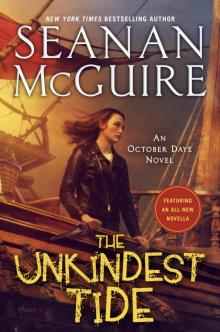 The Unkindest Tide
The Unkindest Tide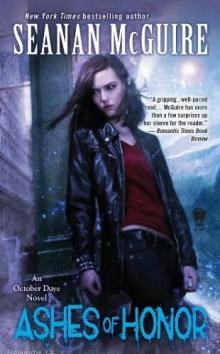 Ashes of Honor od-6
Ashes of Honor od-6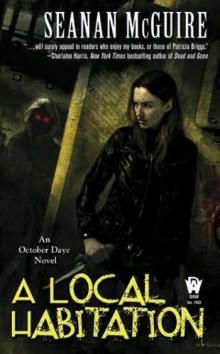 A Local Habitation od-2
A Local Habitation od-2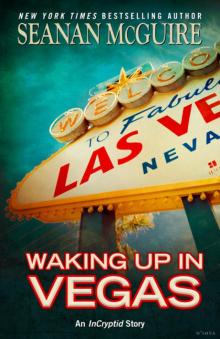 Waking Up in Vegas
Waking Up in Vegas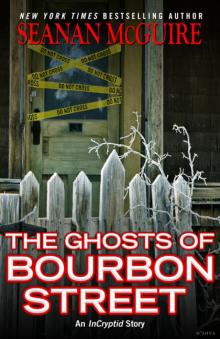 The Ghosts of Bourbon Street
The Ghosts of Bourbon Street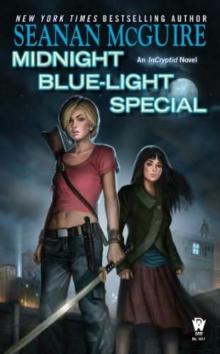 Midnight Blue-Light Special i-2
Midnight Blue-Light Special i-2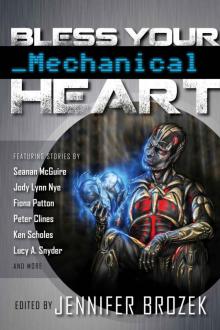 Bless Your Mechanical Heart
Bless Your Mechanical Heart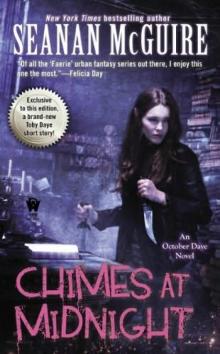 Chimes at Midnight od-7
Chimes at Midnight od-7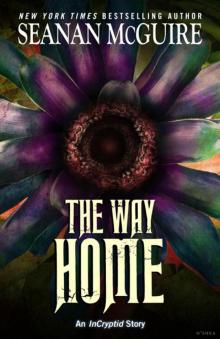 The Way Home
The Way Home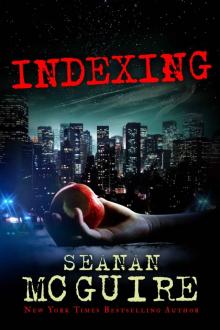 Indexing (Kindle Serial)
Indexing (Kindle Serial)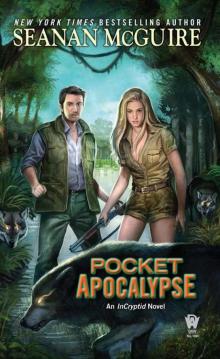 Pocket Apocalypse: InCryptid, Book Four
Pocket Apocalypse: InCryptid, Book Four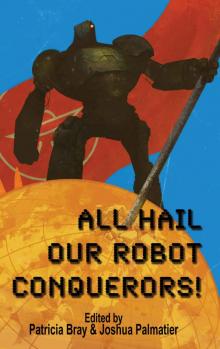 All Hail Our Robot Conquerors!
All Hail Our Robot Conquerors!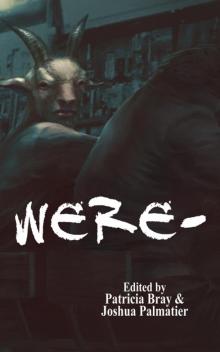 Were-
Were-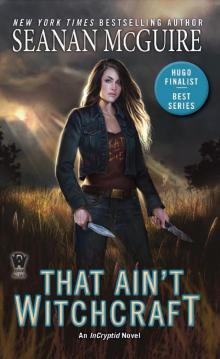 That Ain't Witchcraft (InCryptid #8)
That Ain't Witchcraft (InCryptid #8)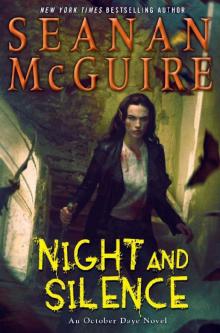 Night and Silence (October Daye)
Night and Silence (October Daye)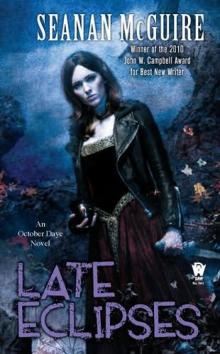 Late Eclipses od-4
Late Eclipses od-4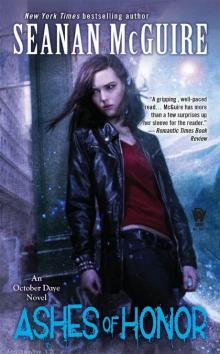 Ashes of Honor: An October Daye Novel
Ashes of Honor: An October Daye Novel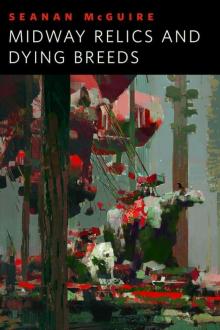 Midway Relics and Dying Breeds: A Tor.Com Original
Midway Relics and Dying Breeds: A Tor.Com Original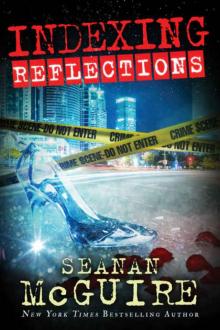 Indexing: Reflections (Kindle Serials) (Indexing Series Book 2)
Indexing: Reflections (Kindle Serials) (Indexing Series Book 2)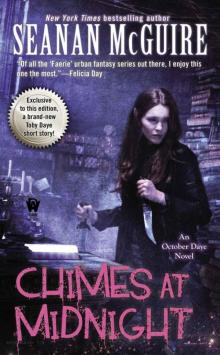 Chimes at Midnight: An October Daye Novel
Chimes at Midnight: An October Daye Novel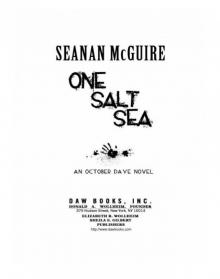 One Salt Sea: An October Daye Novel
One Salt Sea: An October Daye Novel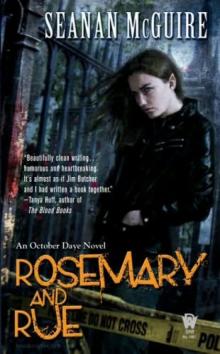 Rosemary and Rue od-1
Rosemary and Rue od-1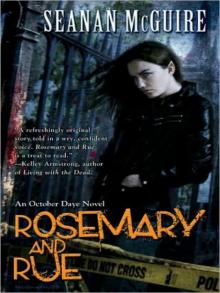 Rosemary and Rue: An October Daye Novel
Rosemary and Rue: An October Daye Novel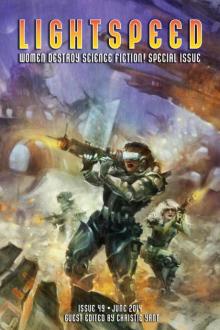 Lightspeed Magazine Issue 49
Lightspeed Magazine Issue 49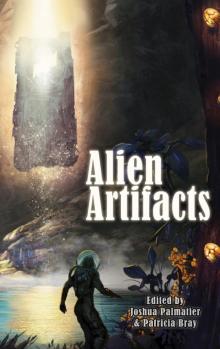 Alien Artifacts
Alien Artifacts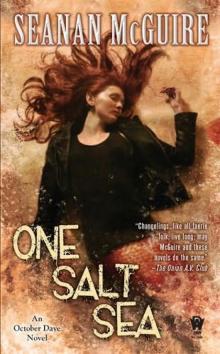 One Salt Sea od-5
One Salt Sea od-5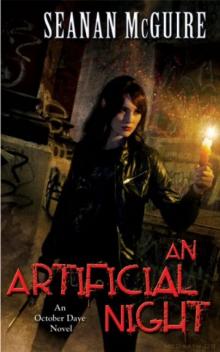 An Artificial Night od-3
An Artificial Night od-3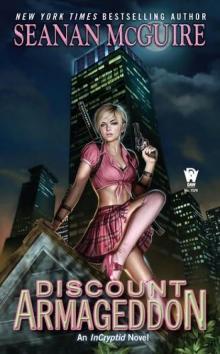 Discount Armageddon i-1
Discount Armageddon i-1